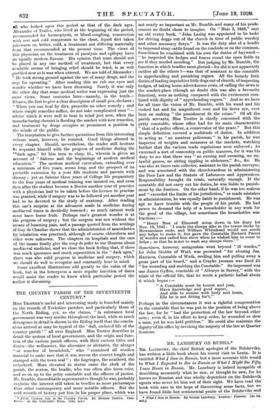THE COUNTRY PARISH OF THE SEVENTEENTH CENTURY.*
Miss Thorrmes useful and interesting study is founded mainly on the records of Yorkshire parishes, and particularly those of the North Riding, yet, as she claims, " in substance local government was very similar thioughout the land, while so much divergence in detail is shown in the Riding itself that the conclu- sions arrived at may be typical of the ` dull, undated life of the country parish' " all over England. Miss Trotter describes in detail the system of local government, and the origin and func- tion of the various parish officers, with their curious titles and duties—the wellmaster, the aleconner or aletaster, the alnager " or searcher of broadcloth," who " examined all woollen material to make sure that it was woven the correct length and stamped with the town seal " ; the hogringer, the neatherd, the swineherd. More elevated in status came the clerk of the parish, the sexton, the beadle, who was often also town crier, and so on up to the petty constable and the officers of justice. Mr. Bumble, discreditable representative though he was, probably explains the interest still taken in beadles as more picturesque than other contemporary and more notable officers. But the cold records of history put him in his proper place, which was • XVII. Century Life in the Country Parish. By Eleanor Trotter. Cam- in.briun : at the University Press. ilOs. net.1
not nearly so important as Mr. Bumble and many of his prede-
cessors no doubt chose to imagine. On " Male 3, 1646," says an old vestry book, " John lazing was appointed to be bedel
for driving doggs out of the church in time of public worship and other necessary dutys." It was the duty also of a beadle to impound stray cattle found on the roadside or on the common. Sometimes he combined with his own the duties of hayward- " he inspected the hedges and fences round the open fields to see if they needed mending." But judging by Mr. Bumble, the function in which beadles most gloried—for did it not apparently outlive all the others I—was that of assistant to the constable in apprehending and punishing rogues. All the homely little duties of leading inquisitive little dogs out of church, of inspecting hedges, of taking home adventurous cows, of calling the news in the market-place (though no doubt this was also a favourite function), were as nothing compared with the excitement com- bined with dignity of " apprehending rogues." And so we have for all time the vision of Mr. Bumble, with his wand and his cocked hat and his magnificent coat and his fierce eye, ever bent on making " the punishment fit the crime." Of all the parish servants, Miss Trotter is chiefly concerned with the petty constable, whose office had for its main characteristic " that of a police officer, a conservator of the peace." But this simple definition covered a multitude of duties. In addition to acting as " an amateur policeman " in his parish, he was inspector of weights and measures at the markets, watching further that the various trade regulations were enforced ; he exercised a sort of censorship on public manners, for it was his duty to see that there was " no cursing and swearing, no un- lawful games, no sitting tippling in alehouses," &o., &e. He was also at times rate collector, assistant to the parish surveyor, and was associated with the churchwardens in administering the Poor Law and the Statute of Labourers and Apprentices. Responsibility brought its trials, naturally enough. If the constable did not carry out his duties, he was liable to punish- ment by the Justices. On the other hand, if he was too zealous and " exceeded the limits of his jurisdiction," or made mistakes in administration, he was equally liable to punishment ' He was apt to have trouble with the people of his parish. He had power to demand the help of a householder in any work for the good of the village, but sometimes the householder was fractious :-
" Henry Best of Elmswell notes down in his diary for Nov. 19, 1642: I made the sheepe dike in the towns beeke by Howsamlane ende, and William Whitehead would not sends any helps to make it, but gave the Constable Richard Parrat ill wordes and called him slave when he wished him to come to helps ; so that he is not to wash any sheepe there.' " Sometimes, however, antagonism went beyond " ill worcles," for John Stubbs of Wath was presented " for abusing Jas.
Harrison, Constable of Wath, reviling him and pulling away a great part of his beard," and a Crayke yeoman was fined £5 " for wounding and stabbing the Constable." So impressed was one James Gyffon, constable of " Alburye in Surrey," with the trials of the official life, that he wrote a pathetic ballad about it which began :-
" A Constable must be honest and just, Have knowledge and good report, And able to straine with body and brain, Ells he is not fitting for't."
Perhaps in the circumstances it was a rightful compensation to the constable that he was put in the position of being above
the law, for he " had the protection of the law beyond other men ; even if, in his effort to keep order, he wounded or slew a man, yet he was held guiltless." He could also maintain the dignity of his office by invoking the majesty of the law at Quarter Sessions.






































 Previous page
Previous page